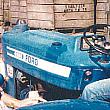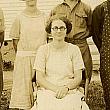
Formation of the WSAM 1972
by Cindy Laug

Leads to Organizing of the AAW, 1974
The wife of a pickle farmer, Connee Canfield, from Keeler, Michigan, founded WSAM (Women for the Survival of Agriculture in Michigan) in 1972.
In September of that year farm wives in southwest Michigan picketed a local apple juice processor because he was underpaying apple farmers in Coloma. Four ladies from the Ridge went down to march in support. They too were having pricing issues and it had been going on for four years. When they returned they knew they had to get plans in place to do the same. They wrote letters to area farm families explaining the issue, what they proposed and why, what they should wear, and why they needed white gloves. Folks would be called to participate when the time was right. It was a ladylike picket line and all wore white gloves as a symbol of remaining orderly.
Emotions were strong and we wanted no violence. They brought signs and their families. A hundred people showed up and they divided and covered two processors. One day was spent in Fremont at the Gerber plant. Doris Kline showed up with her babies, a high chair, and her food processor used to make her own baby food. The picketing went on for six days at which time the processors had agreed to an increase. In 1973, the price went up to $5 per hundredweight. Between New York and Michigan the picketers closed ten processors, and achieved $6.5 million more in income for the apple industries of those two states. Pat Cohill, Joan Hill, Sharon Steffens, and JoAnn Thome were later called the “fearsome foursome.”
The seed had been planted. Legislation was where the changes needed to happen. The topic of Agricultural Marketing and Bargaining Act, which would allow growers to negotiate prices with processors in the future , was the next hurdle. The Farm Bureau’s role was to get it passed in the state senate. WSAM united with the Bureau’s efforts to pass it in the House. They wrote letters to legislatures, the press, and growers. They visited and met with government officials. This landmark legislation, strongly fought by the processors, passed on the last day of December 1973. The original bill was to expire in 1976, and they had to fight to get the expiration date removed.
The newly formed WSAM chartered a bus and went to Washington D.C. to call on the Secretary of Agriculture, bringing up several areas of concern. They requested the Department of Agriculture call a national conference of farmwomen, and even offered the services of WSAM members as hostesses for the conference. It became obvious this conference was unlikely to happen. When the first National Farm Women’s Forum, sponsored by Farm Wife News, assembled on November 12, 1974, over one hundred Michigan women came prepared to organize a coalition. They met well into the night to strategize. Four organizations were prepared at that meeting to vote and launch AAW, (American Agri-Women) a national coalition of farmwomen. They passed a Statement of Purposeand Areas of Concernson November 14, 1974.
One year later, at the second forum, they assembled to pass their bylaws, elect officers, and set goals. This was a national organization uniting to address the national concerns of the food and fiber industry. Their motto: We can do it . . . together.
In 1977 they held their second convention, with over 220 representatives from 33 states, and applauded their 3000 members. “We’ve got to get women elected up through the old farm organizations. A little discreet hell-raising is in order. We try to play it down, deliberately, but we’re militant. We’re activists.”
Both of these organizations still exist today. Below are just a few of the challenges that faced farmers during those early years that these women, united as one VOICE, helped to make positive changes for agriculture.
- Elimination of the “widow’s tax”
- Estate Tax
- 1977 and 1981 Farm bills
- To preserve the family farm* and promote agriculture.
- Repeal of Delaney amendment
- FIFRA – Federal Insecticide Fungicide and Rodenticide Act.
- OSHA regulations
- Testified at hearings
- Michigan Agricultural Marketing and Bargaining Act, 1973
- Migrant Labor laws
- Product Labeling (is it real or imitation? Consumers should not have to be detectives)
- Women finally get representation on many state and federal committees and serve in leadership roles.
- Women are elected to local, state and federal office.
- Sponsor an annual visit to Washington D.C.
In 1981 WSAM brought the AAW National Convention to Grand Rapids, MI. and again in 1997. Today AAW has 57 organizations with over 50,000 memberships serving their membership with their Newsletter – VOICE. Historically, the Michigan farmwomen of our local community can take credit for the creation of the National American Agri-Women. Their work continues today not only in AAW and WSAM, but also in the traditionally male organizations such as Farm Bureau and Michigan Farmers Union.

 facebook
facebook





